#conflict is not abuse
Text

#hamas#israel palestine war#israel palestine conflict#terror#sarah schulman#conflict is not abuse#quote#usa#democrats
4K notes
·
View notes
Text
Sarah Schulman's "If a person cannot solve a conflict with a friend, how can they possibly contribute to larger efforts for peace?" 🤝 Chris Fleming's "You call yourself a community organizer, even though you're not on speaking terms with your roommates"
#been thinking some thoughts#shitpost o'clock#sarah schulman#conflict is not abuse#chris fleming#the grad student shuffle
89 notes
·
View notes
Text
https://theanarchistlibrary.org/library/william-gillis-one-giant-red-flag-folded-into-a-book
So much abuse is about trapping and monopolizing the target’s attention, feeling entitled to claim a chunk of their brain. The experience of being abused is often one of being forced into thinking about the abuser constantly, from trying to predict their acts to trying to follow the latest tangle in their proclamations. Abuse strips away agency by stripping away the capacity for the abused to think for yourself, to think about anything else or think at all. If the abuser controls critical needs then everything is devoted to trying to turn yourself into a complex key that can unlock those needs. If the abuser besieges and terrorizes you randomly, you form your brain into a vast prediction net, trying to preempt as best you can every single avenue by which they might strike. Or you huddle up and turn yourself off, turn your brain off, to try and weather through things like an inert object. All of these are about losing your capacity for agency in a way that extends beyond any physical constraints directly imposed upon you. Abuse takes over your brain.
Sometimes the abuser acts so as to not have to think about you, to terrorize you into smallness and confined predictability, but sometimes the abuser is themselves driven by their own ravenous attention on you and the need to make you dedicate that same level of attention to them. This sort of abuser is never more happy than when their provocations force you into direct immediate raw unthought emotional tangles with them. They yell and yell until you finally yell back, and then they grin in glee because they have you. Neither abuser can stand your escape to any degree, which they read as a direct assault on them.
There are many aspects of abuse, but abusers feel entitled to your attention.
I can’t emphasize this enough. Demanding that an ex listen to you, mobilizing The Community to force that ex to give you a monopoly over their brain is an abuser’s wet dream. It’s how thousands of accountability processes have derailed into an abuser continuously retraumatizing their survivor.
Schulman, it must be emphasized, has no argument for why we should be obligated to give away our attention to anyone who wants it. What she has instead is 1) a fixation on pain and suffering of those denied control over the attention of their targets, and 2) the repeated assertion that having no boundaries is “adult” whereas saying no is “childish.” Mature adults talk things out in person, only immature children—or those so traumatized and broken as to be infantile children—would draw a line around their attention and enforce it.
“In another example from other people’s lives, sometimes angry, supremacist, or traumatized people send emails commanding, ‘Do not contact me.’ I want to state here, for the record, that no one is obligated to obey a unidirectional order that has not been discussed. Negotiation is a human responsibility. Little children order their parents around: ‘Mommy, sit there!’ When adults give orders while hiding behind technology, they are behaving illegitimately. These unilateral orders do not have to be obeyed. They need to be discussed.”
It would be trivial to compose a little passage reversing the associations, casting knowing how to draw boundaries and assert one’s independence and agency as the “mature adult” position whereas being caught under the boot of others’ demands to the point where you can’t own your own associations or attention as the “child” experience. But I want to reject the entire adult supremacist frame she’s appealing to.
If the child often stomps their feet and declares “no”—no, I refuse to give uncle a kiss, no, I refuse to get dressed to be your marionette at an event, no, I refuse to listen to your lecturing—perhaps we should see that as an inspiring site of resistance by those most oppressed before they are ground down. Perhaps we should endeavor to be more like children desperately trying to assert their autonomy and consent as agents who get to choose. Certainly the world “adults” have built and perpetuated by beating each new generation into surrender is a clearly sickening and grotesque one.
Even though I personally have made choices to maintain some level of contact, I vehemently support every abused child who walked away from their parents and never answered their calls ever again. Hell, I support children who killed their abusers. You do not owe everyone a path for reconciliation and negotiation. From abusers to even just wingnuts and inane time burglars, the best option is sometimes to just walk away forever. We have limited time on this planet, why spend it trying to repair every single relationship you have so far happened into?
Schulman somehow cannot even fathom goals other than the maintenance of existing relationships.
“Refusing to speak to someone without terms for repair is a strange, childish act of destruction in which nothing can be won.”
Liberation can be won. There’s a world of possibility beyond the confines of one given relationship. Opportunity cost is a real thing that is worth considering. That nothing is gained in one specific relationship by walking away doesn’t mean that a world of possibilities can’t be gained through the absence and negation of that relationship.
#repost of someone else’s content#C4SS#gillis#sarah schulman#CINA#Conflict Is Not Abuse#abuse culture#abuse apologia#intimate partner abuse#child abuse#parental abuse#ageism#adultism#childism#freedom of association#autonomy#bodily autonomy#youth rights#youthlib#youth liberation#kyla#anarchism#anti nuclear family#nuclear family abolition
78 notes
·
View notes
Text
i see your “conflict is not abuse” and i raise you “discomfort is not harm”
#all the usual provisos#conflict is not usually or necessarily abuse#discomfort is not usually or necessarily harm#you know what i mean#conflict is not abuse
24 notes
·
View notes
Text

I want to talk a little bit about how overstating harm works. Do you see how Vaspider portrays the situation?
In reality, I have not directly interacted with him since 2016. Even then, the extent of our interactions were a handful of reblogs, after which he pretty much immediately blocked me. I occasionally discussed things he had written on his blog, and even more occasionally these discussions were accompanied by screenshots. This is not "stalking." This is not "harassment." This is not, really, interaction at all.
Vaspider didn't even play a role in my downfall! After a lot of acrimony with other people, I very publicly shuttered my old blog, and a few months afterward, publicly announced what my new blog was. The fact that I used to be sobercommunist has been in my header for years.
But Vaspider doesn't tell it that way. He portrays it as something sinister, that I've somehow been lurking beneath his notice. I'm "back" despite having never left and having been completely transparent about where I've been. He must present it this way, because he can't simply disagree with me, because disagreement can be reasonable. Rather, I have to be portrayed as an abuser who poses some kind of danger to him. If I'm an abuser, then I can be dismissed completely, erased, and shut out. This is not a discussion where people disagree; this is justice, being carried out against a perpetrator. See below:
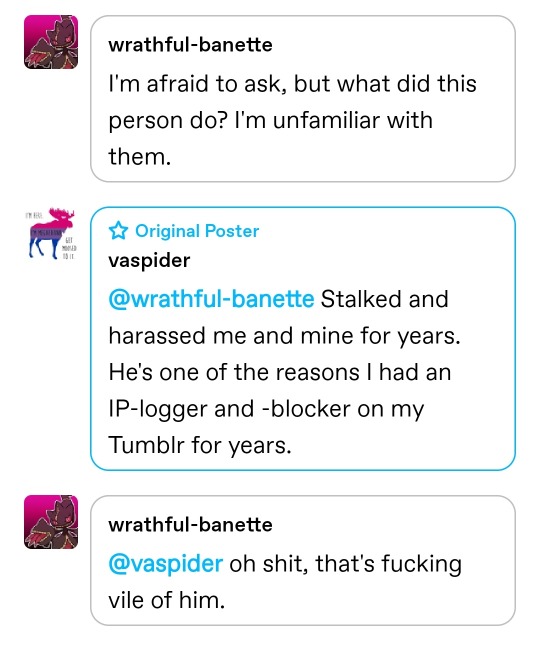
"I'm afraid to ask" well, you would be, because Vaspider is presenting the situation in a completely dishonest way. He is vastly overstating harm, and he does this because it is a tried-and-true tactic of keeping social control. Vaspider is the one with social capital here, not me. He's the one with the following of impressionable young queers who look up to him as a valued elder. He is also the one cashing in on that following by hawking endless pride merchandise at them (which might also explain why he's so interested in maintaining the fiction that people who disagree with him are actually abusers who must be shunned for one's own safety).
He also, publicly and repeatedly, engages with every harassing message he receives, and directs people to read about it in his #harassment tag. As someone who used to do just that, let me tell you: that is not the way to actually deter harassment. Instead, it invites it. What deters harassment is absolute silence and a free hand with the block button, which is what I do now. But that's another topic.
Look, I ultimately don't care, because I've never really relied on the internet for validation, let alone an income. I'm free in ways that Vaspider isn't. But it's something to point out. Read Conflict is Not Abuse. There's a reason so many people hate it, and it's because it nails them to a tee.
As always, throw this on my next callout post baby. Happy stalking.
35 notes
·
View notes
Text
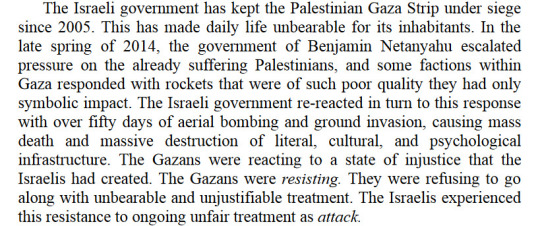
Sarah Schulman, Conflict Is Not Abuse: Overstating Harm, Community Responsibility, and the Duty of Repair (2016)
#sarah schulman#conflict is not abuse#israel#palestine#i've been thinking a lot about this section of her book recently and the way this pattern repeats#i admire her emphasis on the chronology of events and the way she keeps perspective on the material violence happening#a book that has a lot to offer people everywhere i think#my posts
2 notes
·
View notes
Quote
This question of shame seems important in escalation. Why does one person approach a situation and want reconciliation and peace, while another approaches the same situation and needs to shun, destroy, and thereby feel victorious? The business of psychological studies is a messy one. There are so many and they contradict each other, but like poetry, they can stimulate thought. I read an essay by June Price Tangey and Patricia E. Wagner published in 1996, and another by Hadar Behrendt and Rachel Ben Ari written sixteen years later that pointed to a similar answer. Both teams felt that people who come at conflict from guilt approach it very differently than people who come at it from shame. In fact, both studies found that people who come from guilt very much want to negotiate, are able to apologize and admit fault, can make concessions, and are invested in positive resolution. People coming from shame, on the other hand, direct anger, aggression, and blame towards the other party. This difference was explained by the assessment that people who feel guilt experience less emotional stress and anxiety than those who feel shame. And guilty people can therefore focus more on the implication of their own actions on others. They found that those who feel shame also feel more threatened and are deeply concerned about what other people think of them.
Sarah Schulman, Conflict is Not Abuse: Overstating Harm, Community Responsibility, and the Duty of Repair
8 notes
·
View notes
Text
Being in a negative moment with another person can be destabilizing, hurtful, and stressful, especially if a person’s self-concept requires them to think of themselves as perfect. But it is not, by definition, Abuse. It could be Abuse, if one has power over another, but if not, it’s a Conflict. And being in Conflict is a position that is filled with responsibility and opportunity.
Sarah Schulman, Conflict is not Abuse (Vancouver: Arsenal Pulp Press, 2016) 59.
0 notes
Text
Reading "Conflict is not Abuse" by Sarah Schulman and I've reached part three; the discussion of the Israeli apartheid and genocide of Palestine. I highly recommend the book, it has prompted much self reflection; strange to see records of social media posts from nearly 10 years ago nearly indistinguishable from now, especially the use of Hamas as a bogeyman to justify the oppression they resist. That is the nature of this 'conflict' though; it is not some sudden new phenomenon but an ongoing genocide of 75 years.
1 note
·
View note
Text
Congo💔🕊️
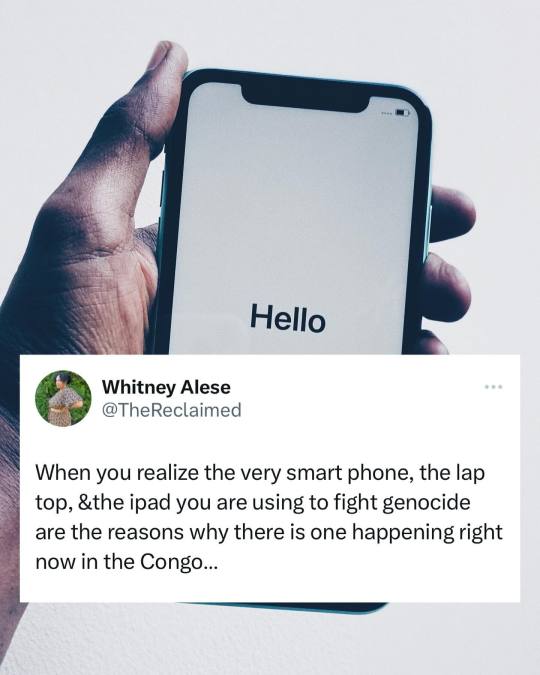
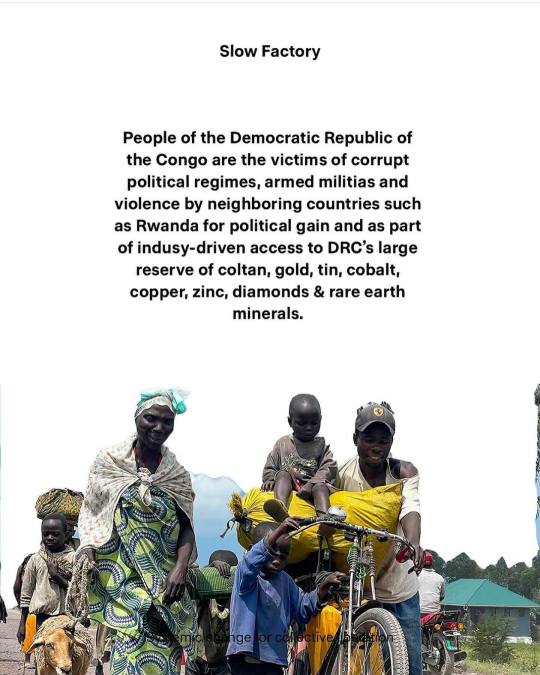
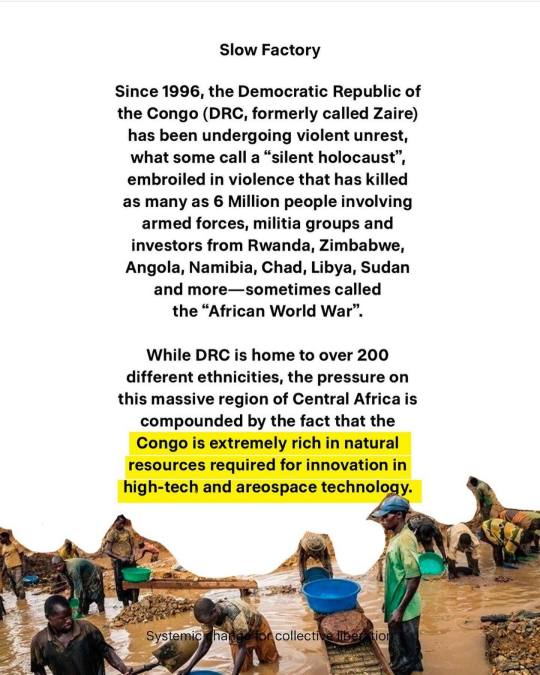
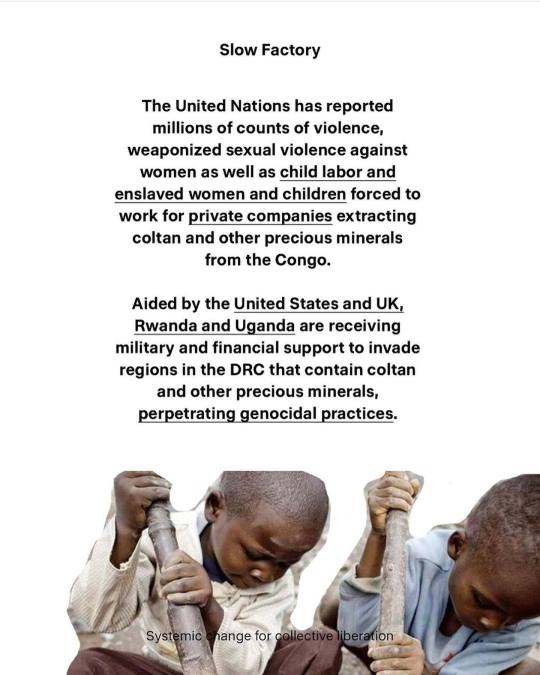
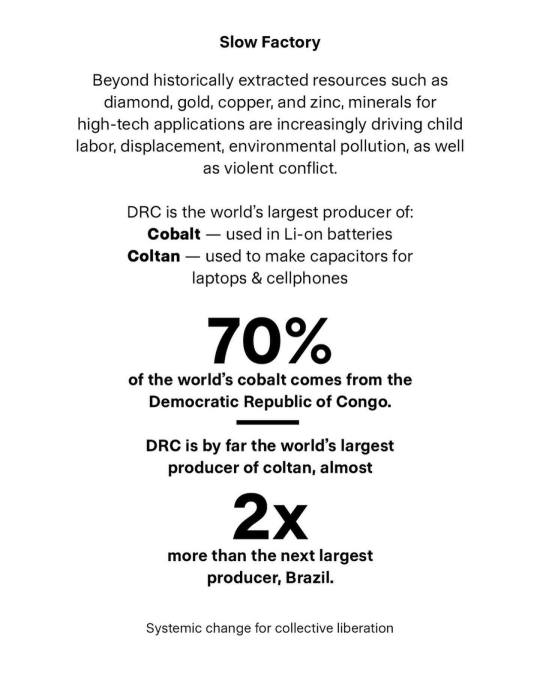
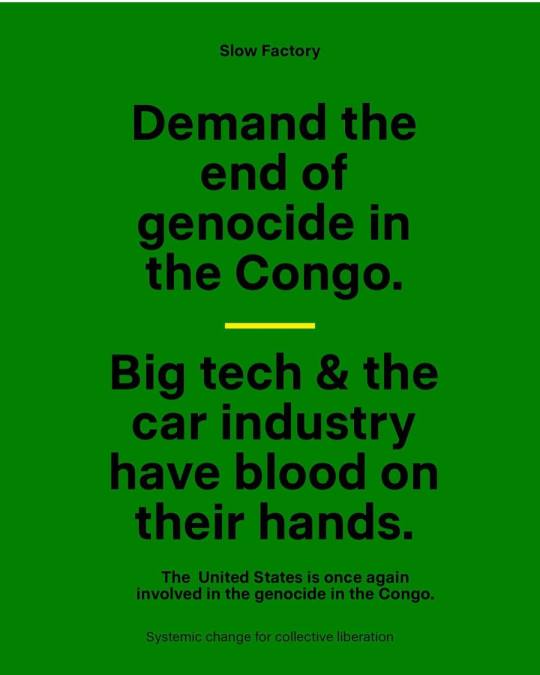
We really cannot be free until we all are free.
#Congo Genocide#Conflict Minerals#Cobalt Exploitation#Coltan Crisis#Resource Exploitation#Human Rights Abuse#Environmental Impact#Corporate Accountability#DRC#Mineral Supply Chain
14K notes
·
View notes
Text
i'm trying to wrap my head around the enormous popularity of conflict is not abuse by sarah schulman. i think that there's an sympathetic pull in her adamant insistence on police abolition - especially as an american - as well as in her emphasis on solving conflicts by hearing out every side of the story and carefully deliberating the best path forward for all. as many fora for activism and political discussion on the left has for some years now suffered an epidemic of shunning unwanted perspectives & people who has been accused of abuse without actually being guilty of anything worthy of the name, perhaps part of the book's popularity is due to a collective thirst for a more understanding culture. however, what schulman advocates is not simply that, but an exaggerated version of it where simply cutting off a friendship you are no longer interested in is morally wrong and where you yelling exasperated at your partner leading them to throw a heavy object in your direction breaking your bones is the fault of both of you equally.
perhaps we collectively lack pragmatism more than anything. most conflicts can be solved empathetically and peacefully and we can allow some conflicts to be so big that social exclusion is necessary. we can acknowledge that ghosting with no prior warning is bad form and allow people to simply opt out of friendships that are no longer satisfactory.
0 notes
Text
"The current paradigm is encouraging all of us to think we are in abusive relationships," Hodes explained. "And if you are not in an abusive relationship, you don't deserve help. Being 'abused' is what makes you 'eligible.' But everyone deserves help when they reach out for it."
Sarah Schulman, quoting Catherine Hodes, in Conflict is not Abuse.
Can you be eligible for support, in your own mind, if you're not a victim of abuse?
Catherine Hodes comes from the world of programs for survivors of domestic violence. I have also worked at two such programs. These agencies provide good anti-poverty interventions: help with housing, food stamps, child care, pet care, transportation, legal assistance, connection to every resource available. Free counseling. These services were free to any survivor, no matter their gender, immigration status, etc. You just had to be a survivor of sexual assault or domestic violence.
Sometimes people would come in who were seemingly in terrible relationships that were not actually abusive. And no one cared, really, because anyone who needs help deserves help.
Material challenges would occasionally arise if both parties felt they had been abused and both sought services from the same agency. But a lot of the issue here is psychic and emotional. Paradigms which emphasize that in instances of harm there is always an abuser and a victim and that an informed outsider can tell who is who leave out a big part of unsatisfying human relationships.
0 notes
Text
conflict is not abuse, sarah schulman
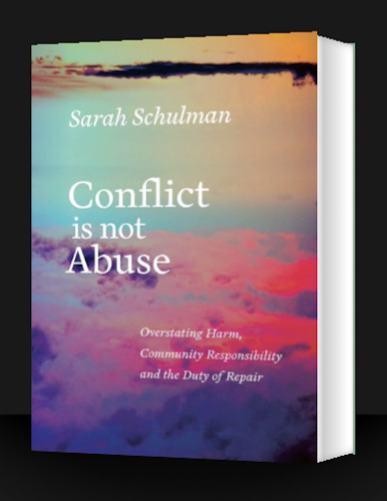
yeah idk. thoughts. not sure. interesting.
1 note
·
View note
Text
Conflict is not abuse,
Sarah Schulman
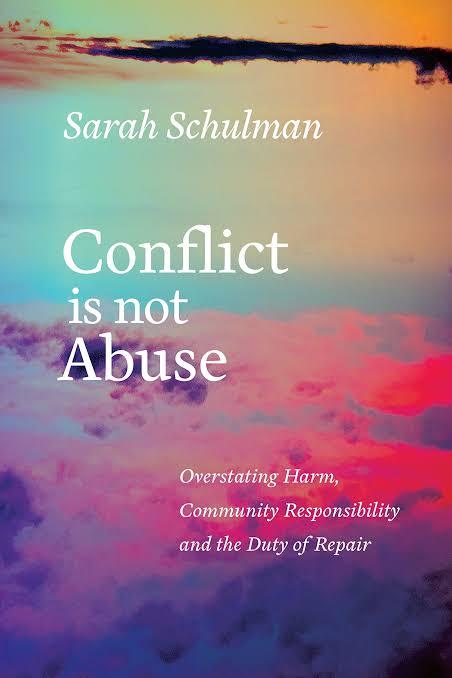
1 note
·
View note
Text
[Il conflitto non è abuso][Sarah Schulman]
Il conflitto non è abuso di Sarah Schulman non è certo un libro che cerca il consenso: quel che insegue è il cambiamento. Un profondo cambiamento sociale che leggendo queste pagine appare più che mai necessario e, per una volta, realizzabile.
Viviamo nel conflitto. Dalle relazioni intime alla geopolitica, abitiamo un mondo di differenze in cui i nostri desideri, i nostri gusti, i nostri limiti, i nostri valori, le nostre credenze sono costantemente in tensione con quelli dell’altro. Viviamo nel conflitto e non lo sopportiamo. Incapaci di gestire il disagio dell’incomprensione umana, preferiamo pensare il mondo in termini di vittime e…

View On WordPress
#2022#ACT UP#AIDS#and the Duty of Repair#Community Responsibility#Conflict Is Not Abuse#gender#Giusi Palomba#Il conflitto non è abuso#Il conflitto non è abuso. Esagerazione del danno#LGBT#LGBTQ#Minimum Fax#non fiction#nonfiction#Overstating Harm#responsabilità collettiva e dovere di riparazione#Sarah Schulman#USA
0 notes
Text
So I've seen a lot of "Jazz works as a therapist at Arkam" in the dp x dc fandom, and while I like the concept, I also feel like Jazz would take one look at the place and immediately be like "what the absolute fuck" at just the everything of the place.
Like, she either nopes out after the tour during the interview or quits not too long afterward starting there, not because she can't take it but because she's so appalled by what's going on there and can smell the corruption rolling off the place and knows no one sent to there is ever actually going to get the help they need.
So Jazz decides to open a private practice instead while still being absolutely determined to work with the various rogues in the city, she is here to help and nothing is going to stop her.
So she just starts showing up at known hangouts of rogues and during their heists/schemes/sprees, and even fights between them and the batfam, just like
"Hi! It’s so nice to meet you! My name is Dr. Jasmine Fenton/Nightingale/whatever last name she’s using and I was hoping we could talk!"
Casually kicks a baterang away without looking because she's being polite and professional!
"I understand that your experience with therapy through Arkam has been nothing but atrocious and that you are rightfully -"
Kicks Batman away without breaking eye contact or a sweat.
"Suspicious of attempting therapy again, and Idon't want to force anything on you, therapy should be on your terms after the experiences you've had but -"
Grabs Robin out of the air as he leaps at the rogue she's talking to and tucks him under her arm, ignoring his feral hissing and all attempts to break her hold.
"-I really think that you'd find it beneficial, even if I'm not the right therapist for you."
The rogue in question is having the time of their life and takes Jazz's business card - and a few extra to pass around - not really intending to actually ever book a therapy appointment with her but way too entertained and excited to share this madness with everyone else.
But then one of the rogues actually looks up Jazz's website and sees all the various safe guards she’s put in place to ensure that any villians that come to her will be protected while seeing her - soundproof therapy room, regular sweeps for listening and tracking devices, the most insane firewalls and protections anyone has ever seen on her network, and ooh she provides snacks and drinks!
So someone finally books an appointment with her, half convinced she's either going to turn them in or is a villain herself intent to experiment on them, but then it’s actually really nice??? And they feel a lot better afterwards?? She doesn't even say anything to indicate that she wants them to stop being villains, she just wants them to be okay??
So more and more rogues start going to her, and Batman was already losing his mind about this woman before - Oracle can't hack her system?!? And her background check shows a totally normal Psychiatrist?? - but now half of Gotham's heavy hitters and a dozen or so other minor league villains are seeing her regularly and every time he tries to get info on any plans the rogues might be scheme via her office it fails utterly. Nightwing got knocked out with something called a creep stick and when he tried to break in himself to get answers she just appeared out of no where and gave him the most scathing lecture about doctor-patient confidentiality before bullying him off her property and threatening to sick her brother on him if he tried again?
And because she's become such a figure in the Gotham underworld, she gets the attention of Joker.
And everyone, rogues and Bats alike, are terrified that she’s going to try and take him on as a patient like she has so many other villains in the city and that's just a recipe for tragedy.
But then the Joker is on his way to the hospital with two broken legs and the fear of god beat into him babbling about eldritch nightmares and whenever anyone asks Jazz what happened she just shrugs and just says things like "I refused him as a patient, he's not my problem." Or "My brother doesn't like clowns." And just, does not elaborate.
Batman is losing his mind over it all. Jazz is just happy to be able to actually help the rogues. Arkam is less happy about how she absolutely destroys their reputation.
#dc x dp#danny phantom#jazz fenton#batman#jazz becomes Gotham's favorite Psychiatrist for villains#Tucker is the one keeping her network secure#and maybe starts a small hacking war with oracle#the Joker showed up trying to turn Jazz into the next Harley Quinn and ended up face to face with a visiting Danny#Harley eventually recovers enough herself to get her license back and joins Jazz's practice#she works with civilians though because of all the conflict of interest with everyone else#weirdly anytime she has a patient who is dealing with someone abusing them the abuser mysteriously disappears#oracle#batfam#eldritch danny
7K notes
·
View notes